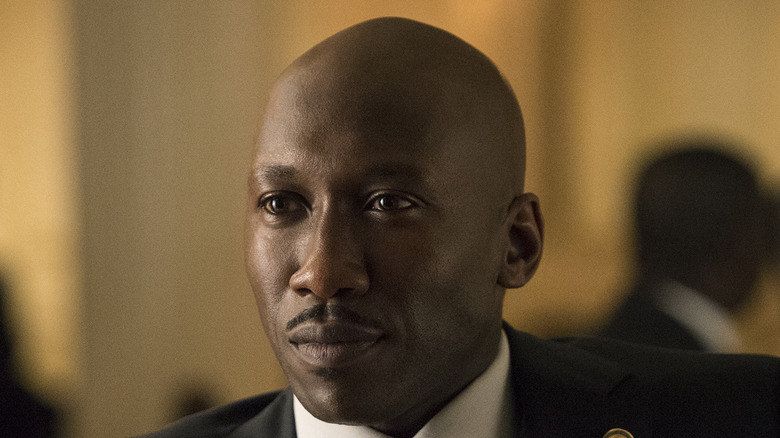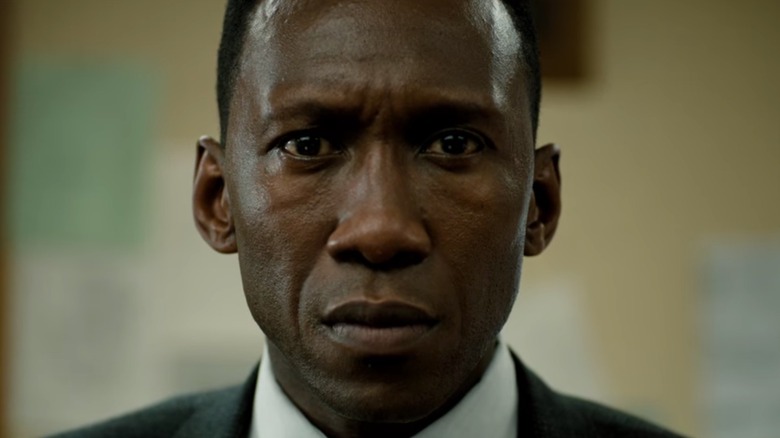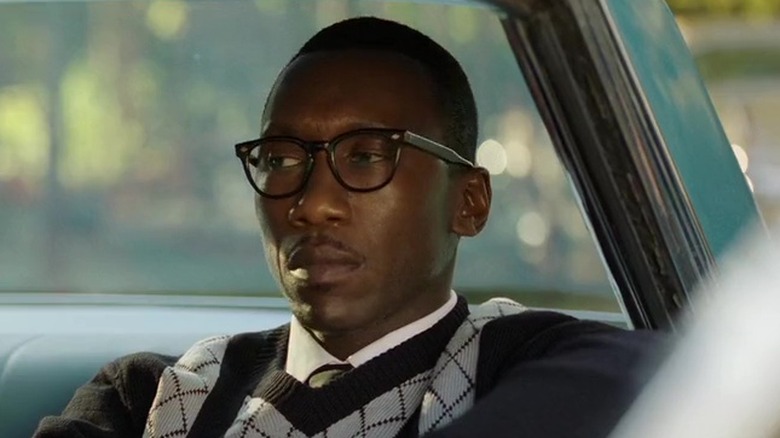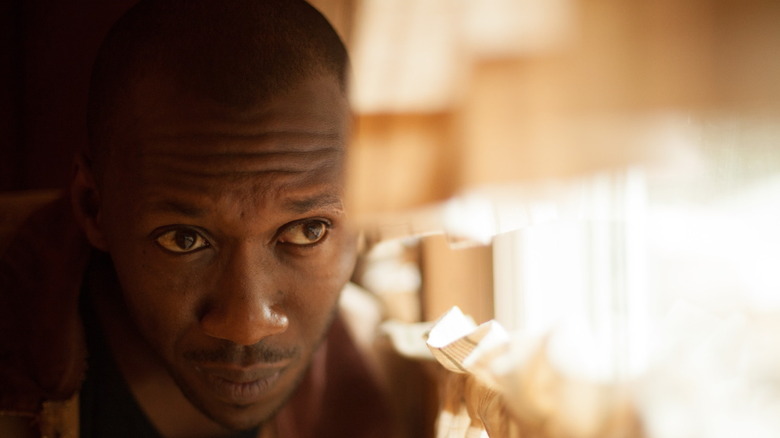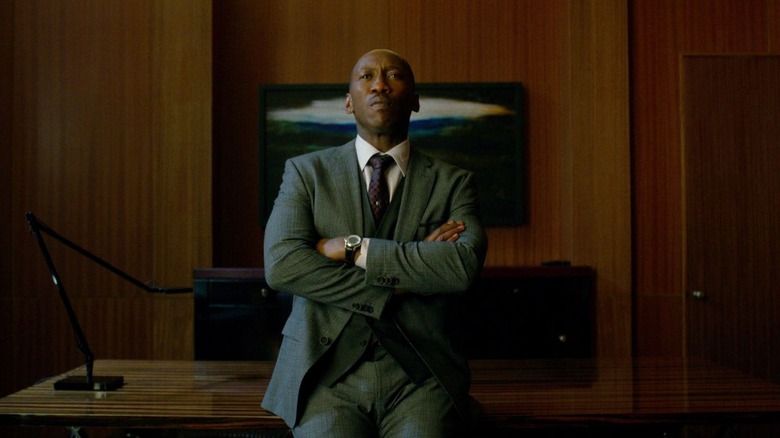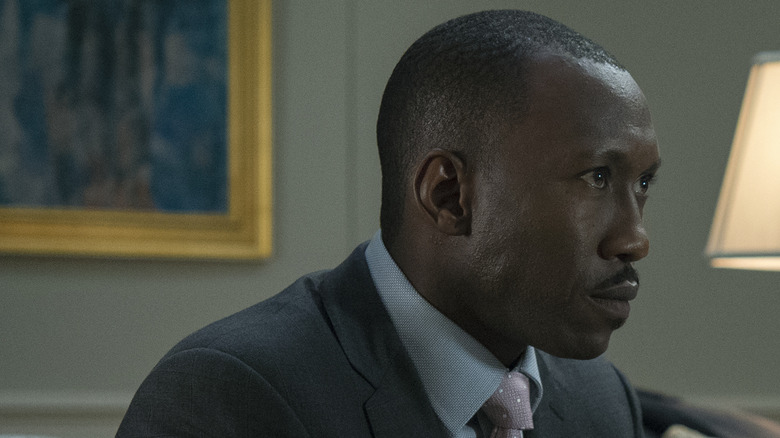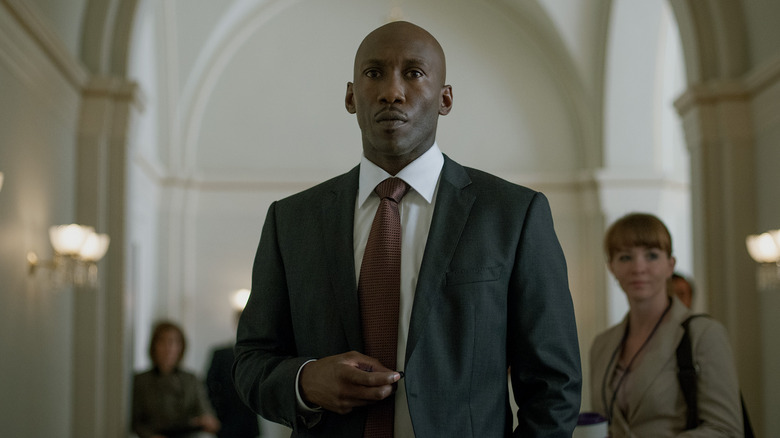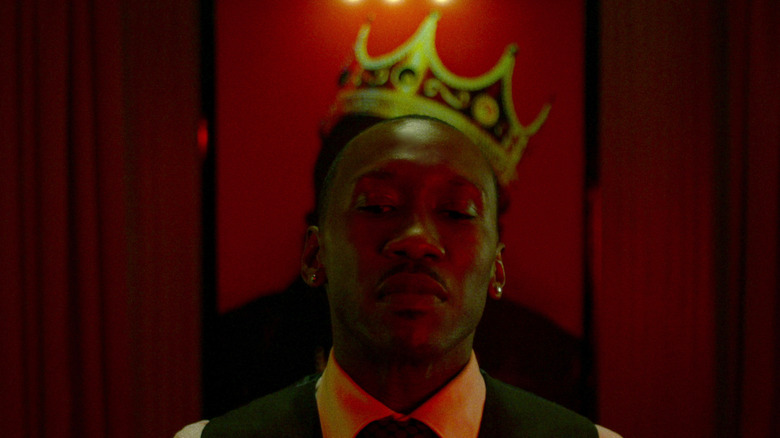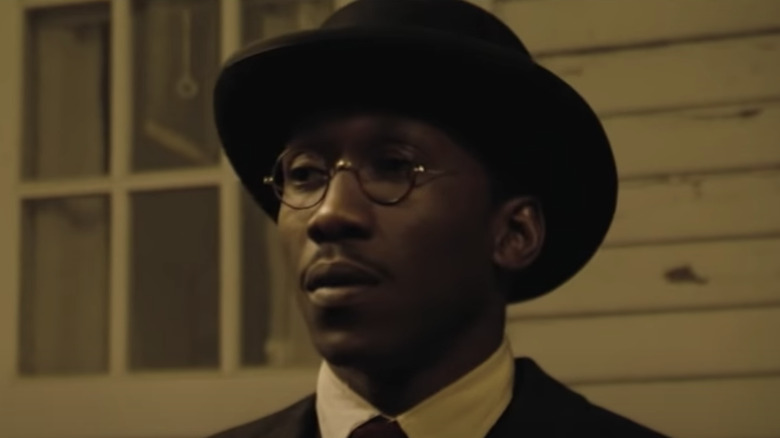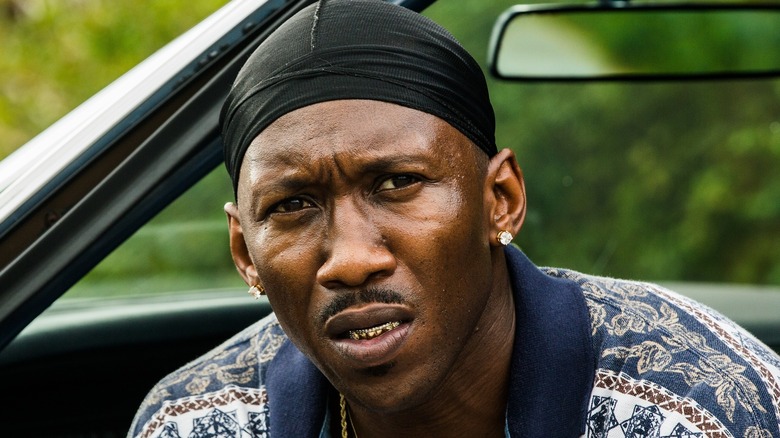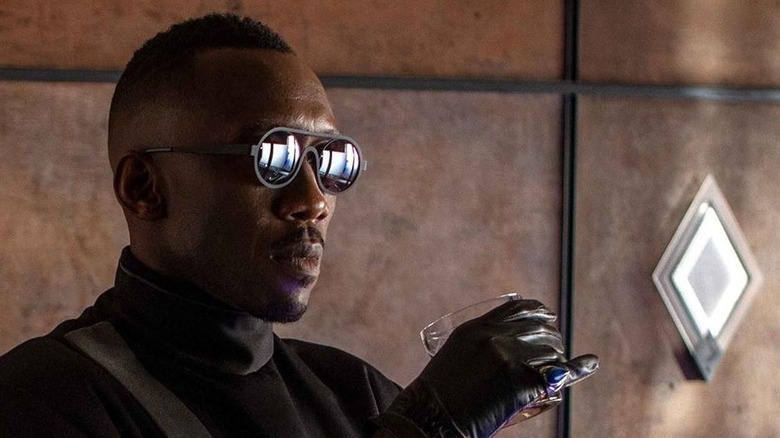The Untold Truth Of Mahershala Ali
Mahershala Ali is one of the most talented actors of his generation, and his story adds further merit to the idea that success comes from hard work and nearly endless determination. When he was growing up, Ali had more passion for sports than acting, but that all changed after he joined a stage production of "Spunk" in college. From then on, he had one goal in mind, and he chased it with absolute passion.
Ali's early days in the industry followed the typical pattern. He picked up roles wherever he could, making one-off television appearances and taking on small parts in movies. By the time Ali made his major mainstream breakthrough in 2018, people realized that they'd been seeing his face in everything from "CSI" to "The Curious Case of Benjamin Button." Ali's story isn't one of overnight success, but dedicated work — year in and year out.
Now a multiple Academy Award winner, Ali seems like an unstoppable force in Hollywood. Behind his commanding presence on the screen is a man wholeheartedly committed to his faith and his family. Ali may have one of the greatest careers in modern Hollywood, but this is his untold truth.
Ali grew up in a deeply religious household
Born in 1974, Mahershalalhashbaz Gilmore grew up in Hayward, California. He was named after the second son of the prophet Isaiah in the Bible, and his grandmother, Evie Goines, was an ordained Baptist minister. Years later, his mother, Willicia Gilmore, would follow in her footsteps. In Ali's words, his mother "didn't do backflips" when he told her about his conversion to Islam later in life. Ali said that as a child he "prayed every day of my life," and that early prayerfulness influenced his thinking on religion when he grew older.
Ali's father didn't share the religiosity present on his mother's side of the family — Phillip Gilmore self-identified as an agnostic who was open to considering aspects of all religions. Ali started questioning his father about religion and God when he was 13 years old on a trip to visit him in New York City, at which point his father told him that "he didn't believe that Jesus was God, and that there was a difference, that God was God." That broader understanding of God would later help Ali navigate his own religious awakening and find a place in life as a Muslim.
Ali's father left when he was young
When Ali was born, his parents were still in high school. His mother was 16 at the time, and his father was only 17. Phillip Gilmore was a seriously talented dancer with a passion for musical theater who won $2,500 on "Soul Train," but he still struggled to find work in the Bay Area. Striving to pursue his dreams, Gilmore moved to New York and enrolled in the Dance Theatre of Harlem, where he started traveling with big shows and working as much as possible. The work put a strain on his marriage, and he and Willicia divorced when Ali was three years old.
Ali described his mother's reaction to the divorce as "one of the first things that felt traumatic in my life." After the divorce, Ali stayed close with his father. The two spoke regularly, and Ali would occasionally visit his father in New York. Six years after the divorce, Ali's mother remarried; Ali and his stepfather occasionally butted heads over the latter's strict rules. "I couldn't date, I couldn't go out," Ali said, describing his teenage years. Ultimately, however, he credits those rules with keeping him out of trouble as a young man.
He fell in love with acting in college
As a teenager, Mahershala Ali didn't have dreams of becoming a famous actor — in fact, he went to Saint Mary's College in 1992 after earning a basketball scholarship. It was there that he had his first acting experience, after his professor Rebecca Engle approached Ali about taking a role in the school's production of "Othello." Ali told the Hollywood Reporter, "That scared me, but it let me know what she thought of me." Instead of doing "Othello," Ali took a role in a different play, one his father had taken him to see during a visit to New York.
"Spunk" is an adaptation of three stories from Zora Neale Hurston written for the stage by George C. Wolfe. "It was borderline revolutionary for us to do a black play in a college that was 90-some-odd percent white," Ali said of the production, crediting his role in "Spunk" with serving as "the trigger" for the entirety of his acting career. As he put it, what he discovered he loved about acting was being able to examine "the seeds of other people's dysfunction, with the goal to crack it open and shed light on it." He had found his passion in life — and he pursued it with the same determination his father had put into his own artistic career.
His father's death made him reexamine his life
Mahershala Ali's father passed away while Ali was still in college. Ali was only 20 years old at the time. "He wasn't well before he passed," Ali told Vanity Fair, adding, "When he wasn't well, I would perform." At the time, those performances mainly consisted of reading his own poetry to his father, but those quiet readings prepared Ali for the monologues he would later deliver as auditions for acting roles. After his father's death, Ali began pursuing acting in earnest.
Immediately after his father's death, Ali held in his pain. He felt that he "needed to be strong" for his grandparents, who were grieving intensely. Not much later, Ali, like his father before him, moved to New York City to chase his dreams, and it was there that the loss of his father really struck him. "I finally had something that he could deeply connect with, where there would have been a real sense of pride, and he never, ever saw me act," Ali wrote in the Hollywood Reporter. Working through that deep sense of loss, knowing that he and his father shared a similar passion helped motivate Ali through the struggles of an early acting career.
Ali converted to Islam in 2000
While Mahershala Ali worked his way through grad school, he began to question his faith, asking himself why he held his beliefs, and he came to the conclusion that they'd been given to him by his mother. After making that realization, Ali felt he needed to "really take some ownership of my spiritual beliefs." He decided to read books that ran the gamut of spiritual and religious practices.
Ali attended a mosque on a trip to Philadelphia, and there he had a spiritual awakening. He was watching the imam give the khutbah, or sermon, when he suddenly started crying. Ali couldn't understand why he was so moved because the khutbah was given in Arabic, which he couldn't understand. A week later he went to another mosque in Brooklyn, and once again, he became overwhelmed with emotion during the prayers. That very day he made his pledge, converted to Islam, and took his new last name. Ali told the Guardian that converting "didn't necessarily seem that deep a thing to do. And then 9/11 happened."
In addition to newfound cultural struggles, Ali's conversion also strained his relationship with his mother. During his SAG acceptance speech, Ali spoke about his mother's difficulty accepting his new path in life. Fortunately, although it took over a decade, they "are in an extraordinarily positive place today."
Ali met his wife at the same time he found Islam
Mahershala Ali may have never found Islam if he hadn't met his wife, Amatus Sami-Karim, who he encountered while he was in grad school and she was studying acting as an undergrad at NYU. Amatus had been raised by an imam, and when she met Ali, she too was questioning her faith. She wasn't sure whether or not she wanted to continue being a Muslim, but she introduced Ali to the faith all the same. As he described it, "She was almost coming out of it, and I was going into it."
For about 12 years, Ali and Sami-Karim had little contact. Sami-Karim was attending the Tisch School of the Arts and pursuing her own artistic career; today, she works in performance arts and has acting credits and musical releases of her own to her name. Ali, meanwhile, was busy working his way up the ladder in the acting world. The two reconnected later on, and in 2013 they married. By that point, they'd known each other for nearly 17 years, and four years after their wedding, they had their first child.
Ali had a rap career
Mahershala Ali is a man of many talents. He discovered his love of acting while studying on a basketball scholarship, and while he worked to get his acting career off the ground, he also wrote music as a rapper. Though he's now fully dedicated to acting, in the early 2000s, Ali wrote and performed under the hip-hop moniker Prince Ali.
Pep Love, a member of the underground hip-hop group Hieroglyphics, discovered the talented young rapper and the group decided to sign Ali to their record label, Hiero Imperium. According to label manager Tajai Massey, Ali showed up with more or less a full album ready to produce. "He came finished," Massey explained. "I recorded one song on his album with him. It was complete, so it wasn't like I had to do anything."
Ali's album "Curb Side Service" was released in 2007. Although it's been over a decade since the record's arrival, Massey said he hopes "people would revisit his record because it's a timeless record." After the release, Ali decided not to tour with Hieroglyphics to promote "Curb Side Service." What might seem like an odd decision to some made perfect sense to Massey at the time — as he put it, "Rap doesn't pay as much, man."
Acting made him decide to change his name
Not everyone changes their name in life, but Mahershala Ali has done it twice. He was born Mahershalalhashbaz Gilmore, and after converting to Islam, he took the last name Ali, at which point he performed for a period as Mahershalalhashbaz Ali. He's credited as such in his earliest roles, including his role in David Fincher's "The Curious Case of Benjamin Button." Ali's first name comes from the longest name in the Bible, and he admits that using it "was sort of a crazy thing to do considering that we're in Hollywood." In spite of the lengthy name, he didn't get much professional pressure to change it.
While working on "The Place Beyond the Pines," Ali made the decision to shorten his name himself. His motivation was purely practical. Ali's full name wouldn't fit on a movie poster, and he didn't like the sound and feel of "M. Ali." Ultimately, he felt that there was "this relationship that has to be cultivated with an audience" to succeed in Hollywood, and he "didn't want a couple of syllables to get in the way of me having the fullest experience as an actor."
He won an Oscar and welcomed a daughter in the same week
After years of working in the industry, Mahershala Ali landed a memorable role as Remy Danton in Netflix's "House of Cards" the same year he married his wife. Wider and wider audiences were beginning to recognize his work, and the role scored Ali an Emmy nomination. Shortly after that, he was offered a part in the Barry Jenkins film "Moonlight," which Ali told Vanity Fair was "the best script I've ever read."
Then, in 2017, everything changed. Amatus gave birth to their first child, a daughter they named Bari, just a few days later, Ali won his first Academy Award. Ali says that he and his wife "still joke about" their dual pregnancy — her with a child, him with an Oscar. He also describes that moment in their lives as being "like a jigsaw puzzle which my wife and I had to try to put together." The challenges of having a new baby came just as Ali's career exploded in the wake of the Oscar. Navigating all that change, Ali says, "took a lot of listening to each other." He added, "Every now and then we had to hit a tuning fork, to make sure we were in sync."
After years of acting, Ali obtained mainstream success
Decades into his career, Mahershala Ali has truly made it big. Just two years after winning the Academy Award for Best Supporting Actor in "Moonlight," he took home a second Oscar for his work in "Green Book." The world now recognizes Ali as one of the best actors of his generation: In 2020, the New York Times listed him as one of the 25 greatest actors of the 21st century.
Ali isn't just interested in taking on weighty dramatic roles. He's also had his eye on mainstream blockbusters for quite a while. He told Vanity Fair that he wanted to be cast in a Marvel movie "because of the way in which people really connect to 'em," and he had his first opportunity to enter the comic book adaptation world when he portrayed the villainous Cottonmouth in Netflix's "Luke Cage." After that, he joined the cast of the animated "Into the Spider-Verse" as Uncle Aaron, also known as the Prowler. Now, of course, fans of Ali and Marvel are eagerly anticipating his leading role in the upcoming "Blade" reboot. There's nothing Ali can't do, given the opportunity, and it looks like he'll have no shortage of opportunities moving forward.
